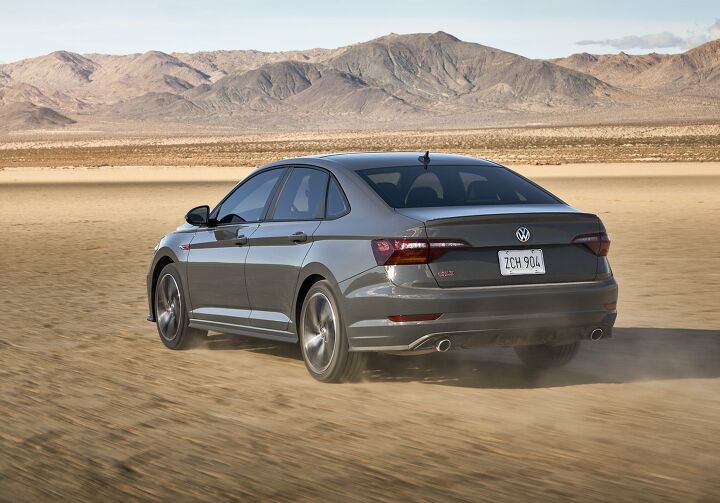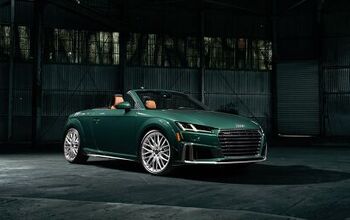Rise After the Fall: Volkswagen Posts Third Year of U.S. Sales Gains, but the Car Question Remains

The annual sales volumes of Volkswagen’s U.S. arm, if placed on a line graph, would resemble deep sea swells, rising and falling by significant amounts as the company reinvents itself again and again. Today, Volkswagen of America is an SUV-heavy automaker that really wants you to think about eco-conscious electric cars.
The utility vehicles are here. More are on the way, but so too are a selection of EVs. With 2019 sales now on the books, we can look at the current wave and speculate as to its final height.
Last year was the third straight year of gains for Volkswagen, with the automaker’s U.S. sales rising 2.6 percent to 363,322 vehicles. Continued increases for both the Atlas (up 37 percent) and Tiguan (up 22 percent) helped propel the automaker to an annual sales win. The redesigned Jetta also saw its fortunes rise in 2019, climbing 11 percent over 2018.
After attaining a 3-percent-plus market share in 2012 — the brand’s best slice since the 1970s — VW volume fell away in the following years, accelerating in 2015 with the help of the diesel emissions scandal. The trough of the latest wave, 2016, saw the company sell 322,948 units.
There’s still a long way to go before VW matches or exceeds the brand’s current-century high point (438,134), but the anticipated volume of this year’s Atlas Cross Sport (due out in the spring), could nudge 2020’s tally over the 400k marker. The automaker anticipates an annual U.S. volume of roughly 40,000-50,000 vehicles from the new nameplate. Meanwhile, the Atlas itself undergoes a helpful mid-cycle refresh for 2021, appearing later this year.
The small, sub-Tiguan crossover dubbed the Tarek won’t be along until 2021, it seems. All that said, there are things that stand to hurt VW in the coming year, and these factors can be found in the company’s passenger car stable.
As midsize cars are what they are, Passat sales shrunk 66 percent in 2019 as buyers looked elsewhere and VW prepped a 2020 refresh. There could be some improvement in the present year, but you can’t bank on a huge rebound. The Golf, which saw its popularity plunge in the U.S. in recent years, is gone from the U.S. in 2020, along with the more popular SportWagen (10,991 sales last year). Only the GTI and R versions of the eight-generation Golf are expected to make it to these shores. The Beetle (17,215 sales in 2019) is gone for good, too. As well, the new-for-2019 Arteon (first sold in April) doesn’t trade in the kind of volume that can offset these losses in any significant way.
As for the Jetta, that model — going by monthly sales tallies — seems to have plateaued after launching in mid-2018, meaning the upcoming VW crossovers will mostly end up replacing lost car volume. Will the rise in CUVs more than offset the abandonment of cars? Time will tell.
With a full complement of crossovers on tap for 2021 and the first of the ID-badged electrics arriving very late this year, next year stands to be another interesting one for the automaker. Market forces and consumer acceptance of new technology will dictate whether or not the VW wave gains in height.
[Images: Steph Willems/TTAC, Volkswagen]

More by Steph Willems
Latest Car Reviews
Read moreLatest Product Reviews
Read moreRecent Comments
- Probert They already have hybrids, but these won't ever be them as they are built on the modular E-GMP skateboard.
- Justin You guys still looking for that sportbak? I just saw one on the Facebook marketplace in Arizona
- 28-Cars-Later I cannot remember what happens now, but there are whiteblocks in this period which develop a "tick" like sound which indicates they are toast (maybe head gasket?). Ten or so years ago I looked at an '03 or '04 S60 (I forget why) and I brought my Volvo indy along to tell me if it was worth my time - it ticked and that's when I learned this. This XC90 is probably worth about $300 as it sits, not kidding, and it will cost you conservatively $2500 for an engine swap (all the ones I see on car-part.com have north of 130K miles starting at $1,100 and that's not including freight to a shop, shop labor, other internals to do such as timing belt while engine out etc).
- 28-Cars-Later Ford reported it lost $132,000 for each of its 10,000 electric vehicles sold in the first quarter of 2024, according to CNN. The sales were down 20 percent from the first quarter of 2023 and would “drag down earnings for the company overall.”The losses include “hundreds of millions being spent on research and development of the next generation of EVs for Ford. Those investments are years away from paying off.” [if they ever are recouped] Ford is the only major carmaker breaking out EV numbers by themselves. But other marques likely suffer similar losses. https://www.zerohedge.com/political/fords-120000-loss-vehicle-shows-california-ev-goals-are-impossible Given these facts, how did Tesla ever produce anything in volume let alone profit?
- AZFelix Let's forego all of this dilly-dallying with autonomous cars and cut right to the chase and the only real solution.




































Comments
Join the conversation
The regular Golf is still an option for 2020. VW finally has the order guides out for all models. It's just sold in one trim as the Golf TSI but you can still get it with a 6 speed manual or an 8 speed automatic, and various shades of Gray or Blue. emichvw.com/vw-order-guides
"My first thought is to forget the US Passat and import the Passat from Europe. Thing is, a Passat in Germany starts at 31,930€, which works out to $35K US, vs $23K for the US version, which isn’t selling." German price includes tax (19%), so actual price for a comparison would be much lower.